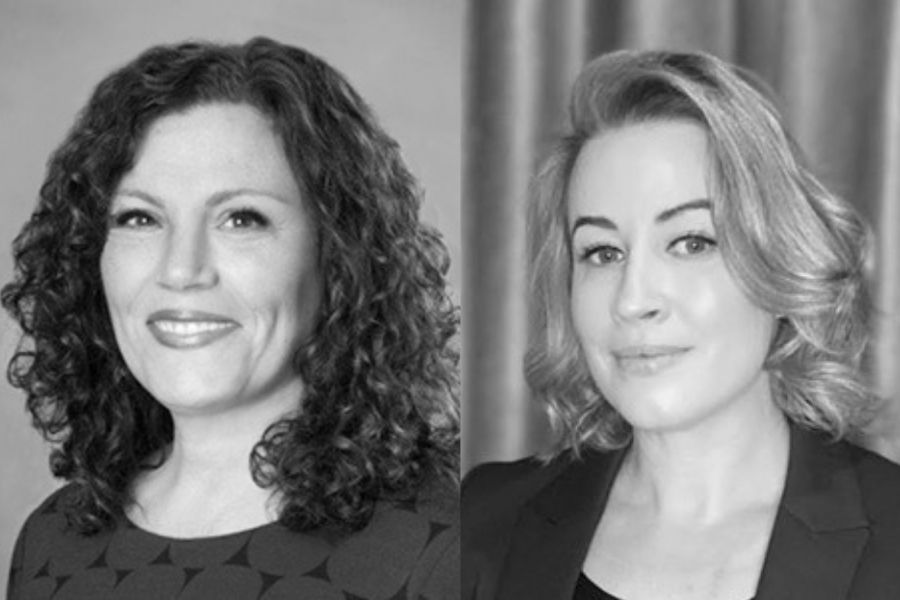By Tracy Tsai, ACC, CPC
With MD promotions being announced at a few major banks recently we wanted to focus on the Finance/Banking industry for this month’s blog. We tapped into the wisdom of Treasa Fitzgibbon and Toni Cortese, executive coaches at Her New Standard, to get some insights on how to advance women in this industry. (And if you’re curious to find out how women and people of color fared in recent MD promotions, see links at end of article.)
*Responses edited for brevity and clarity
Can you give us some background on your experience in the Financial Services industry?
Toni: I started my 25-year career in Financial Services at an investment bank in a tech support function, and worked my way up to managing global support teams of hundreds of people in sales, banking and asset management. I was then tapped to join the corporate strategy team at the bank, and was drawn to more employee-related projects. It eventually led to an internal coach-like position at the bank. I loved it!
Tréasa: I started my 22-year career in a junior operations role at a bank in Dublin, moved to London into more front office roles in sales, and eventually moved to New York and ran a global sales team. In my last few years, I moved into an internal consultancy role within the product part of the organization consulting for sales people; a lot of that was focused on people management.
What do you think are the typical barriers women face in finance/banking?
Tréasa: As a society, but especially in banking, I think we overvalue masculine leadership traits like charisma, confidence and decisiveness, and we undervalue more feminine traits like empathy, humility and high emotional intelligence. But I remind people that it’s the behaviors we overvalue that got us into situations like Lehman Brothers and Enron; we rewarded risk-taking, even when it was extreme. People have biases towards what they believe are “good” behaviors, which tends to undervalue what women bring to the table. These unconscious biases impact how we expect men and women to behave and as a result, we hold them to different standards.
Toni: Corporations are generally male constructs. For example, I once had a manager who talked to me as we came out of a meeting saying, “Toni, before the meeting, you had very strong views on what had to be done. But then you walked into the meeting and asked what others were thinking and if anyone had any ideas.” My reaction was, “And?” But his view was that I should have walked in and said, “That’s how we are doing it. Let’s go.” I wish I had the insight then, but that was a very masculine approach to leadership. It wasn’t that I wasn’t expedient, because I was–I just didn’t go in thinking that I absolutely had the best way to do it. Maybe someone else had a better idea. It’s unfortunate, but we are rated–and compensated financially–against male values.
Tréasa: The style that Toni described is democratic, vs. her manager’s, which is autocratic. The autocratic style might work well in the short term, but to build a cohesive team, you need to be humble enough to acknowledge that other people have opinions.
Toni: Yes, and there needs to be a balance. Women are very capable of quick decision making as well, and there are times when that’s needed. But there’s also a right time for longer-term consideration and for collaboration. I also coach in the tech industry. And, in my humble opinion, many of these companies are at the opposite extreme.There is so much collaboration that sometimes things don’t get done, and they don’t know who is making the decisions. The point is – we need balance of what men and women both bring to the table.
How is the culture in banking different from other corporate environments?
Tréasa: The culture is a lot more antiquated and “straight-laced” compared to other industries. Diversity is still not embraced as widely, so it’s the type of place where a black woman may show up with ethnic hair and be told that it’s “unprofessional.” Paternity leave is another example; three years ago, a member of my team took paternity team, and one of my superiors called it “career suicide.”
Toni: Yes, it’s more patriarchal. But I think the industry is going to go through a massive change in the next 10 years as Millennials and Gen Z come into leadership. It’s going to be interesting to watch.
What mindset or strategies do you think can help women succeed in this industry?
Tréasa: I would like to answer this question with a slightly different lens–that women don’t need to be “fixed,” cultures and organizations need to be fixed. While there are things that women can do to navigate this culture, they shouldn’t have to. Corporations should be responsible for changing the culture. So it’s a two-pronged approach.
What are some things that you think organizations can do to help change the culture?
Toni: I think HR departments can take on more responsibility to change the culture more integrally and organically. It’s about creating an environment where we can educate each other and call out negative behavior. In a team lunch once, my boss made a joke about his concern over his 8-year old son wanting to ice skate, and there were a few chuckles. I called him aside later and told him that his comment could have been hurtful to me because my son is gay. I know he didn’t mean to hurt anyone intentionally, but I had to tell him so that he would be more sensitive to his audience in the future. We have to educate each other and leave room to forgive mistakes.
Tréasa: Yes, and allies and bystanders can more easily call out behavior on someone’s behalf because the victim may not feel psychologically safe enough to do so. For example, if Toni wasn’t comfortable speaking up, I could have gone up to him and said, “Did you know Toni’s son is gay? I’m not sure that comment landed well.”
Toni: Another way to do this organically is reverse mentoring, where “I learn from you and you learn from me.” The focus is on educating one another, regardless of the seniority of the people involved (though I do suggest mid-level to more senior women are involved). For this to work well, participants have to feel psychologically safe, and the topics or suggested points of discussion should be ones of transparency and vulnerability.
How can managers and leaders help?
Toni: Leaders should be on the lookout for ways to create inclusion. Each leader could start by considering, “Who in this meeting / group could feel like an outsider”? It could be someone of another race, gender orientation, seniority, social class, introvert/extrovert, etc. Then find a way to bring them “in” and make them feel like they are a valued part of the team (maybe ask them for their opinion, etc.). This is not just a gender-based issue, so let’s work on making every potential outsider feel comfortable and able to contribute in their own way.
Tréasa: And that’s why accountability is important. Performance reviews at most banks are tied to the “what” (the results) rather than the “how” (behaviors such as creating environments that allow employees to thrive). For example, a toxic manager who creates unpleasant work environments should not be rewarded just because he hits his numbers. Goals for managers should also include employee satisfaction, staff retention and talent progression within the organization, and those who create these environments should get recognition and rewards for this. Behaviors such as high emotional intelligence, conflict resolution and diplomacy (while getting things done) should also be recognized. Companies are starting to achieve more diversity through hiring, but until these behaviors are tied to financial rewards, it will be difficult to retain the diverse talent.
You both mentioned creating psychologically safe spaces. How can that be accomplished?
Tréasa: People have to feel safe to share ideas, think innovatively, express disagreement, debate topics, etc. To do this, you have to show you are willing to listen to people regardless of their seniority, and as a leader, you want to take people on the journey with you. However, it’s not enough to say you want this. People have to actually feel it. For example, if someone on your team disagrees with you, is your response to shut them down immediately, or do you get curious and ask questions to gain a better understanding? Do you truly listen and make people feel comfortable enough to debate, or does your team see examples of where raising a concern leads to negative repercussions? Also, constantly consider your position of power. Do you tend to surround yourself with people who tend to say “yes” to you, as they are wary of the fact that you have the power to impact their career positively or negatively?
Toni: Towards the end of my banking career, I created a program for employees that gave any individual access to a senior person to discuss any matter they wished to discuss, confidentially (except if there was a legal violation). It was extremely successful. Topics included discussing bureaucracy issues, ideas for policy changes, seeking advice involving other people (manager, peer, employee), or advice for career progression. The goal was to give employees a voice, to understand what issues existed beyond the employee survey, and to create more employee engagement. Programs like this can provide a psychologically safe environment.
What are three pieces of advice you think are critical for women in Finance?
Treasa:
- Your job is not the same thing as your career. Your job is what you need to get done, and your career is more than that. Even if you spend 99% of your time on your job, it will not “speak for itself.” Be intentional about managing your career. What do you want, and what do you need to do to get there?
- Director and MD promotions are not about doing your job well, but whether the organization sees you as a future leader. This includes showing your ability to influence, to negotiate and to de-escalate conflict. These are skills that can be learned and practiced. Also, be strategic about your exposure. People promote people they like and know, so have you invested time in these relationships? How do you draw attention to the skills that you have?
- Take ownership and responsibility for your career, rather than depending on your manager to do that. While managers do ultimately make the decision to promote you, don’t underestimate your ability to influence how that decision gets made.
Toni:
- Don’t let your inner critic stop you from going for what you want. Rather, focus on your gifts–what sets you apart from your peers? Lean on that instead.
- How you do your job matters as much, if not more, than what you do. Think about who you want to be before every meeting or call, and then be that!
- Be transparent and authentic. I’ve never seen “holding the cards close to your chest” work very well.
How did your experiences impact your journey to becoming an executive coach?
Tréasa: In 2015, I realized that work was taking up all my energy, to the detriment of other parts of my life. I decided to work with a coach to break some of my beliefs and hold me accountable. I became fascinated with the process of coaching, so I got my coaching certifications with the idea that it would make me a better manager and leader. I eventually realized that I could have a bigger impact outside of an organization than within it. Now I can put my full energy into coaching, which I do through the lens of gender equity and equality.
Toni: Following the 2008 credit crisis, I was managing the sales and banking technology team and was facing transitions both at work and in my personal life. I hired a coach, and after just one session, I went into work the next day with a whole different attitude. I continued to see my coach after that, but that first session was a pivotal moment that changed my life. When I hit my 25-year anniversary at the bank, it was the same month that I got my coaching certifications and my youngest child graduated from grad school. It felt like a sign, so I took the leap into coaching!

Stats on Managing Director Promotions
Citi
• 306 people were promoted to Managing Director in December 2021
• 35% of the new MDs are women, up from 29% in 2020
• In the US, 35.3% are Black, Latino or Asian
Bank of America
• 314 people were promoted to Managing Director in January 2022
• More than 55% of new managing directors are women or people of color
Morgan Stanley
• 199 were promoted to Managing Director in January 2022
• 33% of the new MDs are women (compared to 35% last year).
• In the U.S., the number of ethnically diverse MDs promoted is up 43% from last year
•10% of the class are Black, 6% are Hispanic, and 20% are Asian
Interested in learning how HNS can support your women leaders?
Enjoyed this post? You might also like…




